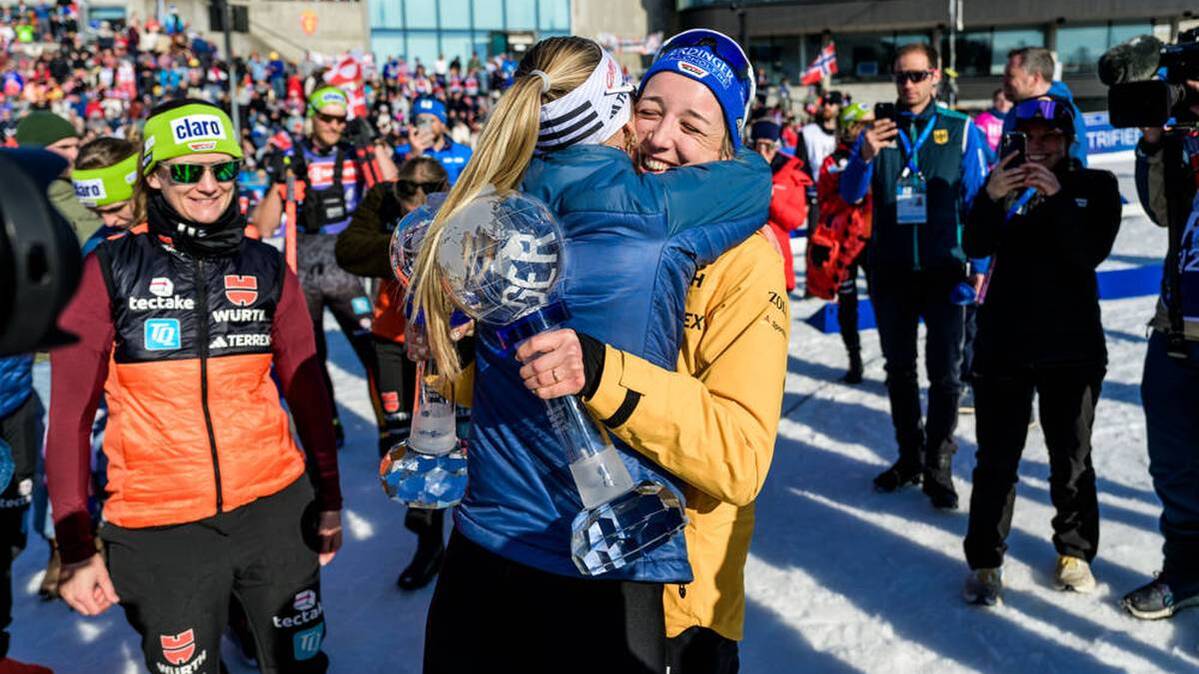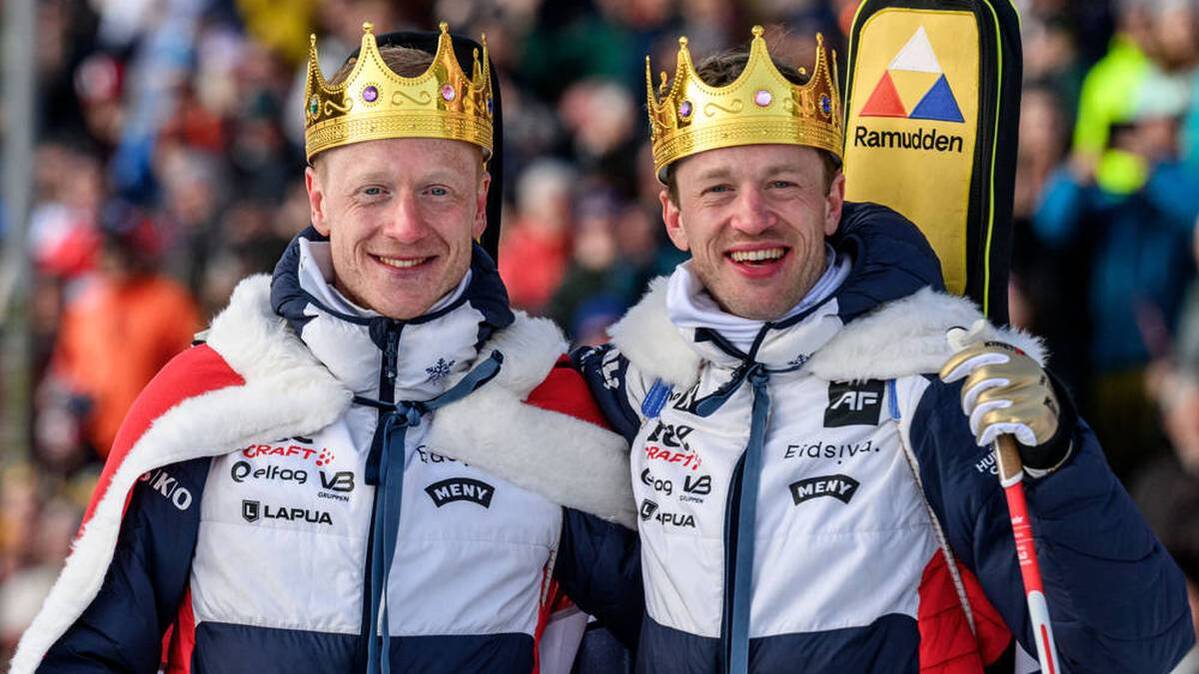It was one of the most memorable weekends in biathlon history, in front of and behind the scenes.
The dramatic World Cup final between winner Franziska Preuß and the unfortunate fallen Lou JeanMonnot and the fair together afterwards, the emotional farewell to the Bö-Brüder: The World Cup on the legendary Holmenkollen in Oslo will be remembered for a long time. Olympic champion Michael Rösch was up close as a Eurosport expert -and gives new insights into the special events in the big Sport1 interview.

Franziska Preuss in the Siegestaumel am Holmenkollen in Oslo
The Season Champion of Turin 2006 also speaks about his expectations of the era after Bö, the problems with German men – and the rosy prospects for women, but in the event of powerful competition.
Sport1: Mr. Rösch, Franziska Preuss has secured the overall World Cup in a way that could hardly have been more dramatic. How did you experience the crucial minutes?
Michael Rösch: It was incredible. There were so many scenarios in advance and in the end it ran out of everyone – both go to the final round in first place and two. Meaned: Anyone who arrives first wins the thing. The level was sick. Sick well. In the course of the last round, Elvira Öberg fought back on, but then had to be teared off again. So the two could make things out among themselves. And then this came a curve where I just thought: that shouldn’t be true. At the finish line, Franzi was not at all happy because of JeanMonnot’s fall. It was a small fog over this victory for a short time.
“Franzi has not indebted Lou’s Sturz”
Sport1: As you already talked, JeanMonnot lost the duel on the last round through an unfortunate fall. How do you rate the scene – were you afraid that Prussia could be punished?
Rösch: In the first hustle and bustle I thought that the two had briefly touched their ski tips. At the first repetition, however, I noticed that Lou stung her left floor in the back of the ski. Sure, it was tight. Both wanted the ideal line. However, because it quickly turned out that the two did not touch themselves, I was not afraid of a punishment. Franzi did not indebt LOUS Sturz.
Sport1: Nevertheless, Preuss immediately turned after the finish, waited for JeanMonnot, went to her and comforted her.
Rösch: The way Franzi went directly to Lou, without being happy, speaks absolutely for her humanity. She also said herself that she finds it a shame how it went out. As a result, the positive emotions are sometimes lost. It would have preferred her if the overall World Cup had been decided in a one-on-one duel on the home stretch. On the other hand, it was a brutal, but also a beautiful picture that Franzi was directly at Lou with her head and made sure what really happened.
Fairness in biathlon sports
Sport1: Despite all the disappointment, JeanMonnot was extremely fair – this fairness distinguishes biathlon sport?
Rösch: Definitely. At the beginning of the season, Franzi and Lou saw themselves as competitors. They respected each other, but had no intimate contact with each other. Somehow you felt that the longer the season lasted and the more exciting the fight became, the narrower the relationship became. They hugged themselves much more often, we kept bowing in front of each other – the more suitable the pictures from the target area in Oslo were. One of the greatest things wins at all, the other loses it and yet both are in their arms and crying. These were very, very emotional pictures that I will not forget so quickly and that say a lot about biathlon sport.
Sport1: At the big final party on Sunday, Preuss even wore a French jacket, JeanMonnot, in turn, a German.
Rösch: Exactly. I was there too and suddenly Franzi stood in front of me with the France jacket, ten seconds later Lou ran past a Germany jacket. Both spent a lot together afterwards and Franzi said: Lou is Franzi and Franzi is Lou today. It was super beautiful and specifically seen. But not only how the two behaved, but also everyone else. Trainer, wax, supervisor from France and Germany, all celebrated together and drank beer. There was no resentment, the whole drama for the fall was long forgotten.
“Lou didn’t want a protest from the start”
Rösch: Lou, Franzi told me, didn’t want to protest from the start. I know the French trainers well and believe that they only wanted to see the pictures in general. Many stand somewhere else during the races and may not really notice the situation. It could really have been that Franzi brought her down. But there is no one with the French who says: We absolutely want to win that at the green table. That’s why they quickly withdraw the protest, and that was a good thing.
Franzi can “withstand blatantly stark as a scrap press”
Sport1: Because Prussia has mastered both shooting and running very well, her potential was always undisputed. But they often braked injuries and illnesses in their career. Hand on heart: Would you have thought it possible that you can still fulfill your dream of the overall World Cup?
Rösch: 99.9 percent yes. The 0.1 percent is missing because of its illnesses and injuries, from which it often suffered. But I was sure relatively quickly that this season can be the winter by making it. Franzi ran so many consistently good races and landed only four times outside the top 6. And what almost impressed me was how she came back from difficult situations such as the defeat in the pursuer in Oslo. What Franzi has for a beet, how mentally strong it is – it can endure pressure, which is more blatant than a scrap press. She had so much pressure, but how she put it away and went her way until the last race is outstanding.
Bö-Brüder are “two absolute icons”
Sport1: In addition to the great triumph by Franziska Preuß, the last races of Johannes Thinges and Tarjei Bö sterania determined the headlines. How did you experience their farewell?
Rösch: I have been in Oslo myself many times and ran a lot of races there, but I can’t remember such a stark atmosphere – even at the 2016 World Cup. You realized who stepped down here. These are not one or two hand lamps, but two absolute icons. A pair of brothers who wrote history. The appreciation shows that Martin Fourcade came extra. I found the Sunday crazy: Tarjei grabs the flag in the back of the field and is celebrated, Johannes Thinges fights for sixth place until the end and let Jakov Fak sprint on the home stretch. It was almost surreal because it was over so quickly. I thought he might even stop and waves into the audience again. But no, he pulled it through completely.
Sport1: What made the two so special – on the one hand sporty, but above all beyond?
Rösch: Tarjei sent me another message half an hour ago: “Thank you my good. It was incredibly great years.” We weren’t the best friends, but something like that means a lot. They are just so incredibly human and are well received everywhere. Some of them remained a child, but sometimes also so professional. Johannes Thinges was a super talent, he received these skills from God. Tarjei, on the other hand, the meticulous worker who always had to fight himself up – and in the end the numbers speak for themselves. You have won everything there is to win. That won’t be available again so quickly.
Sport1: Johannes Thingnes Bö is only 31 years old and he lacks only a few victories for the Eternal World Cup record by Ole of a Björndalen. Can you imagine that it will itch in his fingers again in a few years?
Rösch: No, definitely not. Johannes Thingnes and Tarjei have even announced that they are getting really fat and they are no longer recognized in six months, then that would no longer be possible ( laughs ). However, I don’t know how much Johannes Thingnes really scratches that he has not reached this benchmark. If he had only been pushing for a year, he could have made it easy. But that’s the point again: that he didn’t care about the numbers in the end. That makes him man.

Johannes Thingnes and Tarjei Bö were duly celebrated as a farewell
Sport1: The Bö-Brüder leave a large gap. Who will be the measure of all things in the next few years?
Rösch: Sturla Holm Laegreid would be the logical answer, but I don’t think someone will dominate so much again. For the simple reason, because there are some candidates who can mix very high. In my opinion, Eric Perrot is also a great contender on the yellow jersey. Likewise, Tommaso Giacomel and Campbell Wright when they bring a little more consistency into their achievements. Not to forget Isak Frey, a very young Norwegian. Or big names like Quentin Fillon Maillet when he gets his shooting problems under control.
Sport1: And what about the German men? The shooting weakness throws a shadow for the season. Can the problem be solved until the 2026 Winter Olympics?
Rösch: It will be very difficult, but it is feasible. Some things can improve quickly if you get into a kind of flow. When you talk to the boys, you keep hearing that they are at a very high level in training. However, the transfer to the competition is missing. You have to work on that, you have to do it there too. In the end, no sow is no longer interested in how to shoot during training. You now have to create friction areas in training in order to be able to deal with the pressure in the competition better. This requires a good concept.
Michael Rösch was the Olympic champion with the season in 2006
France is ranking Germany
Sport1: Of course, the triumph of Preuss brings everything out for women. But the younger German biathletes also put a good winter. How do you assess the services of athletes like Selina Grotian or Julia Tannheimer?
Rösch: Selina is ninth in the overall World Cup and only 21 years old, Julia Tannheimer even two years younger. You don’t need to discuss the two, they bring everything you need for a successful career. If the two go their way in peace, these are two names that can one day stand at the forefront. What happens behind it, you have to wait: When will Janina Hettich-Walz come back? What about Vanessa Voigt? What happens to Johanna Puff? Julia Kink had to end her season prematurely – so there are already five or six names where it looks good. I don’t want to praise everything in the sky, but the basis is definitely there.
SPORT1: Nevertheless, another nation seems to be detrimental to women: France. In the overall World Cup, five French women placed among the top 8, including some very young athletes – and the French also determine the action in the second -class IBU Cup. Is there a similar dominance here as in previous years among the Norwegian men?
Rösch: It looks almost like that. I am still in contact with my former Belgian team. And even there, the general secretary now sends the young athletes to France. Sometimes over 500 runners start at regional races, but sometimes there are only one and a half or two minutes between the first and 50th place. What we currently see with Océane Michelon, Jeanne Richard or Paula is only the tip of the iceberg. There can still be a lot of athletes. They draw from the successes of the past few years, the TV quotas are great, all children want to do biathlon.